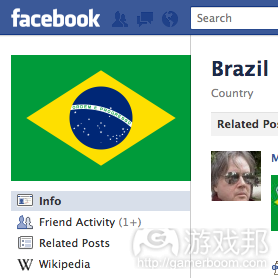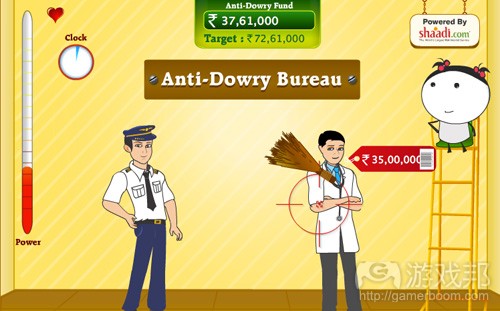每日观察:关注Facebook巴西用户增长情况(1.18)
1)comScore最近报告显示,2011年Facebook在巴西新增近2400万用户(超过了谷歌社交网站Orkut的新增用户数量),月独立用户达到3610万。不过Orkut同一时期在巴西市场份额并没有下滑,该平台在2011年用户从3270万增长至3440万。
巴西女性Facebook用户投入该平台时间超过男性用户,年轻用户投入时间超过年长用户。
comScore数据还指出,Twitter在2011年用户增幅为40%(新增1250万用户),而拉美社交游戏公司Vostu网站流量也比2010年增加3倍以上,Google+、Tumblr和LinkedIn也分别达到数千万用户规模。
需注意的是,巴西网民总数在2011年增幅有限,仅增加600万左右,目前共达5180万。
2)Facebook Page分析公司EdgeRank Checker最近调查发现,Facebook页面的贴子、消息基本上是在发布3个小时之内获得其他人的“赞”和评论,如果要最大化他人对这些消息的参与度、关注度和流量,Facebook页面主人至少得等待3个小时才能再次发贴(游戏邦注:由于每种消息的内容和受众有所不同,所以发布消息的最佳频率也会有所差别,但一般而言,每隔3小时才能再次发布消息)。
EdgeRank Checker这项调查研究了上个月500多个Facebook页面(平均每个页面粉丝为14万)发布的3万多个贴子,并发现当一个贴子每小时的参与度仅为其最受关注时间的10%,那就意味着该贴生命周期已经步入尾声。每个贴子的平均生命周期为3小时7分钟,而中间值则是2小时56分钟。
值得一提的是,这并不意味着Facebook页面主人就一定要每隔3小时发一次贴,因为一天8次发贴很可能降低发布内容的质量,并让粉丝生厌(多数Facebook页面主人一天仅发贴2、3次)。最理想的发贴频率要取决于页面受众特点、内容产品技术、发布生命周期等其他因素。
3)据GameSpot报道,云游戏服务公司Gaikai最近以《魔兽世界》为演示内容,展示了公司的Facebook游戏云服务技术发展前景。
据该公司首席执行官David Perry所称,Gaikai调查发现73.5%的游戏玩家表示,如果有所选择的话,他们更愿意玩云游戏而非传统游戏。
4)据games.com报道,Playdom中世纪城建游戏《City if Wonder》目前MAU仅32万,这种情况令人担忧它是否也将步《Social City》(关闭项目前MAU为27万)后尘,成为Playdom下一个停止运营的项目。
观察者指出,《City of Wonder》人气下跌或许也将影响Playdom正在进行封测的《City of Might/Warfare》这款新游戏。
5)社交游戏开发商Playfish社区管理员Bevypoo最近在《模拟人生社交版》论坛发贴募集公司新游戏的测试人员,有意者需先通过邮件填写一份调查问卷,通过审核之后方有望成为幸运测试者,但这项测试仅面向积极反馈信息的玩家。
不过Playfish至今未透露其他详情,我们尚不知所谓的“神秘”游戏究竟有何不同之处。
6)据路透社报道,印度婚姻网站Shaddi最近推出一款《愤怒的新娘》Facebook游戏,旨在让人们正视印度嫁妆习俗所引发的问题(游戏邦注:虽然印度法律早已废除女方家属需向男方提供大量嫁妆的习俗,但现在生活中因嫁妆而引发的家庭暴力问题却并不鲜见,甚至有些新郎因女方嫁妆过少而将新娘活活烧死)。
该游戏已在Facebook上线,允许玩家用细高跟鞋、西红柿和煎锅等道具,砸向游戏中的三个新郞以泄愤。新郎受到的攻击次数越多,他所得到的嫁妆就会减少,而玩家的“反嫁妆基金”就会越多,玩家可在Facebook涂鸦墙上晒出自己的“反嫁妆基金”成就。
7)荷兰游戏发行商Spil Games近日宣布2011年12月份公司在世界三个社交游戏平台的月独立用户超过1.7亿,远甚于一年前的4000万,用户在Spil Games网站平均投入时间也已从原来的38分钟增长至84分钟(游戏邦注:社交游戏巨头Zynga在2011年宣布截止3月31日,公司游戏月独立用户达1.48亿)。
Spil Games目前已向全球46个在线游戏网站发布游戏,其首席执行官Peter Driessen表示这一成就主要得益于他们的游戏采用了社交功能。
8)FlowTown最近发布的社交游戏信息图表显示,目前社交游戏玩家平均年龄为43岁,其中以女性用户占比高达54%;没有子女的单身用户占比28%,已有子女的父母所占比例也达到29%。
43%社交游戏玩家拥有大学文凭,年收入在5万-7.4万美元的用户所占比例最高(21%);全职工作者占比最高(41%),其次是退休者(13%)。
67%社交游戏用户同时也是视频或掌机游戏玩家,76%用户在台式电脑玩社交游戏,45%使用笔记本电脑玩游戏,8%是手机社交游戏玩家。
59%用户表示参与友好竞争是玩社交游戏的最大原因,49%则认为互动性更重要,35%则是为了赢取奖励,31%看中协作性玩法。
(本文为游戏邦/gamerboom.com编译,拒绝任何不保留版权的转载,如需转载请联系:游戏邦)
1)Facebook In Brazil: A Big Ending To 2011 Finally Pushes It Past Orkut
Eric Eldon
First there were the stories about Facebook taking over your college campus, then it was your high school or workplace, then your country… now the stories are starting to be about how Facebook has used up all the new users and only has engagement left to gain. But that’s in older markets like the US. The company is still growing worldwide every month on its way to a billion users, and it’s because of places like Brazil.
In 2011, according to a new study out from leading web measurement firm comScore, Facebook added nearly 24 million new users in the country passing incumbent Orkut in December to reach 36.1 million monthly uniques. The Google-owned social network isn’t seeing any drop-off, though, in contrast to US incumbent MySpace’s fate – and in contrast to India, Orkut’s other big market that was lost to Facebook years ago. Instead, Orkut just grew slowly from 32.7 million to 34.4 million in Brazil during the year.
ComScore notes a few more specific aspects of Facebook’s gains: Southeast Brazil started to grow first but now traffic is coming from all over the country; women are spending more time on the site than men, and younger demographics are more likely to be on than older ones.
The data also shows a few other well-known web services having strong years. Twitter grew over 2010 by 40% to 12.5 million. Latin America-focused social gaming company Vostu more than tripled its home site traffic to 4.9 million. Google+, Tumblr and LinkedIn also got into the single-digit millions from relatively small 2010 bases. For G+ fans (I see you hanging out there in the comments!), here’s something else: the measurement firm adds that combined, G+ and Orkut reach a deduplicated total of 34.9 million unique visitors, so still below Facebook.
Social networking growth has been roughly following the trajectory of internet growth around the world, as comScore noted in its 2011 social networking report (which didn’t include December numbers, by the way, which is why I’m writing this article about last year now).
Brazil, however, only grew its total internet audience by a little more than six million, to 51.8 million users. So, how are all these sites growing? It’s quite possible that Brazilian internet users just really love social networking and have begun using more and more of these sites regularly — in fact, comScore’s annual report showed that. But maybe the growth is also from other incumbents who didn’t make the list losing out?
Which leads me to my usual caveat for traffic numbers like these to quiet any potential griping in comments: no third party measurement is perfect, and no, these companies don’t provide outsiders with access to their servers, so the real traffic can’t be tracked. However, Facebook’s ad tool shows very similar numbers comScore’s, with 35.2 million monthly active users as of today. Good enough for me to run with.(source:techcrunch)
2)Study: Facebook Pages Shouldn’t Post More Than 1x Every 3 hours
Josh Constine
The average news feed post by a Facebook Page receives Likes and comments for 3 hours after being published. To maximize the engagement, impressions, and traffic driven by the news feed, Facebook Page owners should wait at least 3 hours between posts.
This new finding from a study by Facebook Page analytics company EdgeRank Checker could help Page owners avoid cutting short the lifetimes of their posts and overshadowing them with new content. Each Page is different and needs to find its own optimal posting frequency depending on its content and audicence, but no more frequently than every 3 hours is a good general guideline.
Last month after Facebook changed the news feed in September, EdgeRank Checker analyzed 30,000 posts by over 500 Pages with an average fan count of 140,000. The company defines the end of a post’s lifetime as when it receives 10% of the engagement per hour as it did in its most popular hour. It’s important to maximize engagement because this influences the EdgeRank, or news feed visibility of a post and a Page’s future posts. Engagement is also strong indicator that a post is being seen and receiving clicks for Pages looking to drive awareness or traffic.
The study found that the average post lifetime was 3 hours and 7 minutes, while the median post lifetime is 2 hours and 56 minutes. After a post’s death, it only receive a trickle of engagement and there’s little lost by posting again.
There is variance in any specific Page’s post lifetime average. Services like EdgeRank Checker can help Pages find their average. Alternatively, Pages can chart their own lifetime by manually recording the total Likes and comments their posts receive every hour and then watching for when they stop accumulating.
To be clear, the 3 hour average post lifetime does not mean Page owners should post every 3 hours. 8 posts a day would likely force them to churn out low quality content and annoy their fans. Optimal post frequency is a separate question depending on a Page’s audience, content production skills, its post lifetime but also other factors.
Most Page owners stick to roughly 2 to 3 posts a day. Update: News outlets and those producing urgent content like TechCrunch should post more often, but they will end up cannibalizing some of the engagement from their past posts.(source:techcrunch)
3)Move over CityVille: World of Warcraft is coming to Facebook
by Joe Osborne
We’d insert our collective foot in our mouths, but no one said it’s going to take yet. GameSpot reports that David Perry, CEO of cloud gaming service Gaikai, demoed its Facebook game streaming service, and guess what game was included in the demo? Yup, World of Warcraft (WoW). According to the website, Perry looks to bring traditional, downloadable games like WoW and shooter Bulletstorm to Facebook in the near future with zero downloads.
Speaking of WoW, Perry said that the most recent expansion, Cataclysm’s “launch-month sales meant that if it was a Facebook app it would have debuted in 67th place,” according to GameSpot.
Perry showed off the Facebook-based game streaming tech at the Cloud Gaming Europe event in London. During his presentation, Perry said that, according to Gaikai’s research, 73.5 percent of gamers would prefer cloud game delivery for traditional games (your Halo’s and Call of Duty’s) if it were an option.
Cloud gaming, an Internet-based method of streaming games to players (and player interactions back to the servers that provide the games) much like videos on YouTube, is all about accessibility. According to GameSpot, it’s only a matter of bringing down the barriers between players and their favorite games to almost nothing to ensure success. As for WoW on Facebook:
Based on how MMOs (massively multiplayer online games) have done on Facebook in the past, we just can’t wait to see this.(source:games)
4)Will City of Wonder be next on Playdom’s chopping block?
by Brandy Shaul
Poor City of Wonder. Playdom’s medieval-esque city-builder on Facebook is really struggling, sitting at just 320,000 monthly active users. While the game and its Facebook fan page are still actively updated, such low user numbers cause me to speculate: could City of Wonder be the next game Playdom shuts down?
Back in November, the company announced the closure of Social City, which fell to 270,000 monthly players before the announcement was made. Do a bit of math, and we can see that the two games are only 50,000 users apart. Could those 50,000 users be enough to save this one, or should we all start saying our farewells to another game?
Furthermore, could City of Wonder’s falling popularity be the reason that City of Might / Warfare is still unavailable? The last update for that game was back in November of 2011, when we were told that Playdom was testing the game in a closed beta. Still, we first heard about the game way back in June at E3, so what’s the big holdup? With City of Might being a more militarized take on City of Wonder, we can’t help but think that the delay has something to do with City of Wonder’s recent state.
Either way (we are just speculating after all), we’ll make sure to keep an extra eye on City of Wonder (and City of Might) and will let you know if things start to look up for either game.(source:games)
5)Playfish gives ‘mystery seekers’ a chance to play ‘something different’
by Joe Osborne
In other words, Playfish has a new game in the works, and the EA-owned creator of The Sims Social wants some beta testers. Playfish community manager Bevypoo has posted an open call-out on The Sims Social forums for beta testers to try the developer’s brand new game. “Playfish is seeking avid and active gamers of all ages for the closed beta of their top secret ‘mystery’ project on the 23rd of January,” the post reads.
In order to be one of lucky few chosen as a beta tester, would-be players must complete a survey, and those approved will receive their closed beta invitation via email. However, those with no plans to contribute feedback while playing the new game need not apply. Playfish is only looking for those that “have what it takes to contribute to making our game the best it can be by launch.”
The lead image of the post is telling as to what Playfish’s mystery game might entail. For one, we already know that the game will involve–duh?–mysteries and could take place in a jungle. Admittedly, we’ve seen nothing of the game. But can’t help but find it funny that, while Playfish offers “something different,” the hints so far are terribly reminiscent of existing Facebook games. We’ll see whether Playfish can prove us wrong sometime in 2012.(source:games)
6)Not Angry Birds, Angry Brides, and this game is anything but a parody
by Joe Osborne
There were nearly 9,000 dowry-related deaths in India in 2010, according to India’s National Crime Records Bureau. And Shaadi, a matrimonial website in the country hopes to bring more awareness to tragic numbers like through a Facebook game, Reuters reports. It’s called Angry Brides, and it’s clearly an Angry Birds knock-off. But no one’s laughing, and really, that’s not the point.
Dowries, usually in the form of valuables or straight up cash, are traditionally given by the bride’s family to the groom to ensure that the bride is taken care of in her new life. While the archaic practice was outlawed in India over 50 years ago, dowry-related violent crimes are a prevalent problem in the country. Some newlywed husbands even douse their wives in kerosene and burn them to death if their demands for more dowry money aren’t met.
“The Angry Brides game is our way of throwing a spotlight on the nuisance of dowry,” said Shaadi SVP of online marketing Ram Bhamidi told Reuters. “According to a 2007 study … there is a dowry-related death every four hours in India. We condemn this menace and have consistently run campaigns on social media to help create awareness of the issue.”
Angry Brides is playable for free on Facebook, and allows players to assault three grooms–a pilot, a doctor and a builder–with items like stilettos, tomatoes and frying pans Angry Birds-style. The more times a groom is hit, the more is deducted from his dowry in rupees and added to the player’s Anti-Dowry Fund, which they can post to their Facebook Wall.
Social games with a cause are certainly nothing new, and especially so in India. (And the Angry Birds formula seems to work quite well for those with something to say.) The Angry Brides slogan reads, “A Woman will give you Strength, Care and all the Love you need … NOT Dowry! Join us … Take a stand … Make a difference!”(source:games)
7)Has Zynga finally met its match in Spil Games … 5,000 miles away?
by Joe Osborne
Fine, give or take a couple hundred miles. Spil Games, a Hilversum, Netherlands-based publisher of social games announced that it welcomes over 170 million unique monthly players across its three global social gaming platforms. That number was recorded in Dec. 2011, and is a leap to the tune of 40 million from the year prior. Better yet, the average time spent on Spil Games’ websites more than doubled from 38 minutes to 84.
But what about Zynga? The now-public creator of mega hits like CityVille is estimated to welcome 150 million monthly unique players, but the most recent official number is 148 million as of March 31, 2011. No matter how you slice it, Spil Games has more if not just as many monthly unique players as the biggest name in social gaming.
“Deciding to embrace social features so pro-actively is clearly paying off for us–we’re seeing a huge leap in user engagement, unique visits, time spent on site and, crucially, in revenues generated by end-user monetization,” Spil Games CEO Peter Driessen said in a release. “Also, by focusing on specific target audiences and delivering the content they love, we’re experiencing growth at a time when many local social networks are seeing a decline in their number of visitors.”
Spil Games had quite a fun 2011, thanks primarily to one thing: diversity. The Dutch social game publisher has its games available on around 46 different online gaming websites from North America to Indonesia and nearly everywhere in between. Zynga and its local rivals have made impressive strides to expand globally and onto mobile within the bounds of Facebook. But, if Spil Games’ numbers are accurate, they’re all playing catch up.(source: games)














































 闽公网安备35020302001549号
闽公网安备35020302001549号